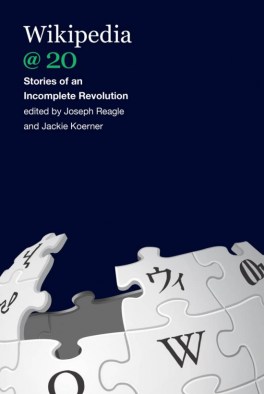How Wikimedians Came Together to Celebrate the First Twenty Years of Wikipedia with a new book, Wikipedia @ 20: Stories of an Incomplete Revolution.
“Wikipedia has gone from being a punch line about the unreliability of people on the internet to becoming one of the most trusted sites online.” –
Katherine Maher
Wikipedia’s 20th birthday is still a couple of months away but many of us could not wait to celebrate! Because this is such an enormous birthday we decided to celebrate in a big way: we published a book. By we I mean over 30 contributors from across the movement – edited by Joseph Reagle and myself, Jackie Koerner.
Two years ago a Call for Participation began the effort. The responses revealed artfully written essays. Each one crafted a picture larger than we imagined. Some describe empowered connections between activism and education. Others chronicle the struggle between authorship and systemic power structures. Contributors showed strength, knowledge, and resilience forged through creating something new in a sea of skeptics.

Many of the contributors make use of Wikipedia as part of their work: scholars, teachers, librarians, journalists, and activists. Many contributors are more than one of these things. This variety is a strength. Written by contributors from all backgrounds, and intended for you – Wikimedians wanting to reflect on the contributions of peers, the projects we find ourselves dedicating incalculable hours to, and the broad and swift river of the Wikimedia movement over the last twenty years.
I want to highlight something from the preface of the book. It’s a great example of the kind of work that our projects and communities embody.
“We hope you will enjoy this unusual collection. It was produced in the wiki-spirit of open collaboration, contains varied voices, and speaks to insights from hindsight and visions for the future. What might you learn in reading these pages? Though Wikipedia was revolutionary twenty years ago, it has yet to become the revolution we need. The important work of sharing knowledge, connecting people, and bridging cultures continues.”
With the approach of Wikipedia’s anniversary, we aspired to create an accessible and coherent work. Gita Devi Manaktala, MIT Press’s editorial director, suggested we make use of PubPub, a new online collaborative publishing platform. Each essay began as a proposed abstract; those selected received editorial feedback. PubPub hosted drafts for peer, public, and editorial review. Finally, revised essays underwent external review before the editorial team made selections for the printed book.
One thing I have learned working with Wikipedia is the immense creativity of Wikipedia contributors. I hope this collection of essays inspires you to do something of your own to celebrate Wikipedia. Think about all the partnerships, edit-a-thons, hackathons, conferences, tools, etc. built over these past twenty years. Is Wikipedia’s birthday a time to gather together to create something new for your favorite free knowledge community? I think so.
With that encouragement to create something, I must acknowledge the demands experienced by volunteers within the community. The ability to volunteer poses challenges, more for some of you than others. Additionally, this year has provided unexpected obstacles in uncountable forms. If you have an idea but feel stuck about how to start or frustrated at the lack of time or resources, I hear you and I see you. Let me know how I can support you.
The open-access edition of this book is supported by generous funding from Knowledge Unlatched, the Northeastern University Communication Studies Department, and a Wikimedia Foundation rapid grant.
Wikipedia @ 20 – Stories of an Incomplete Revolution is available from MIT Press. The book is published with a CC-BY-NA license. The online version includes the essays in the book and a few that did not make it into the print version. It can be found on PubPub.

Can you help us translate this article?
In order for this article to reach as many people as possible we would like your help. Can you translate this article to get the message out?
Start translation